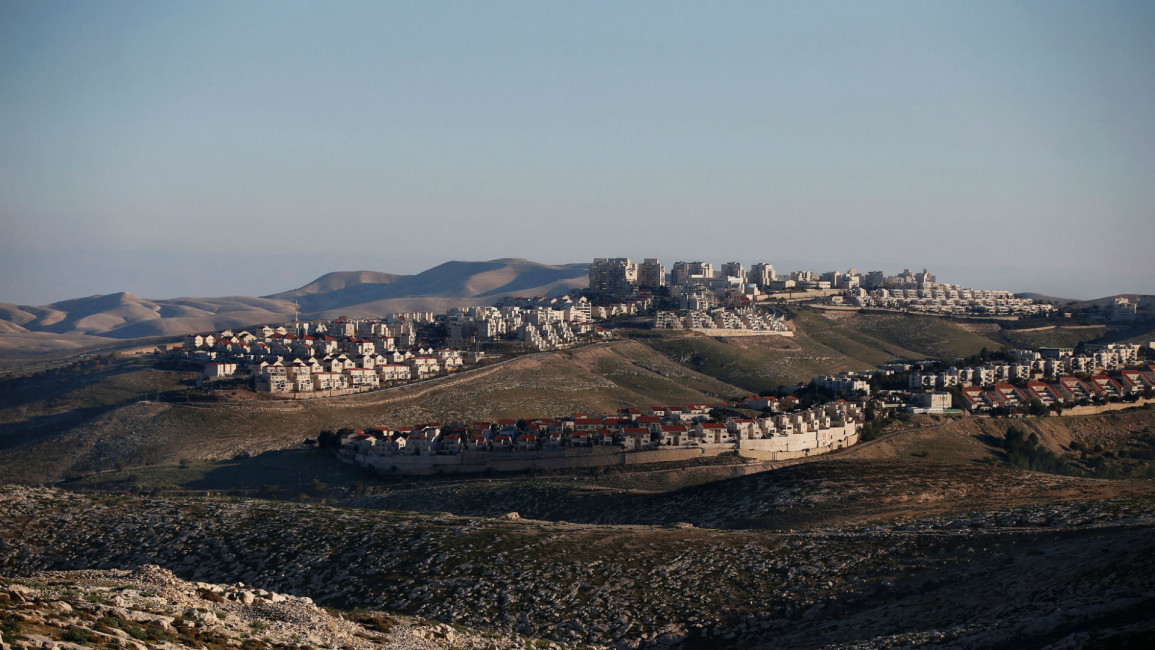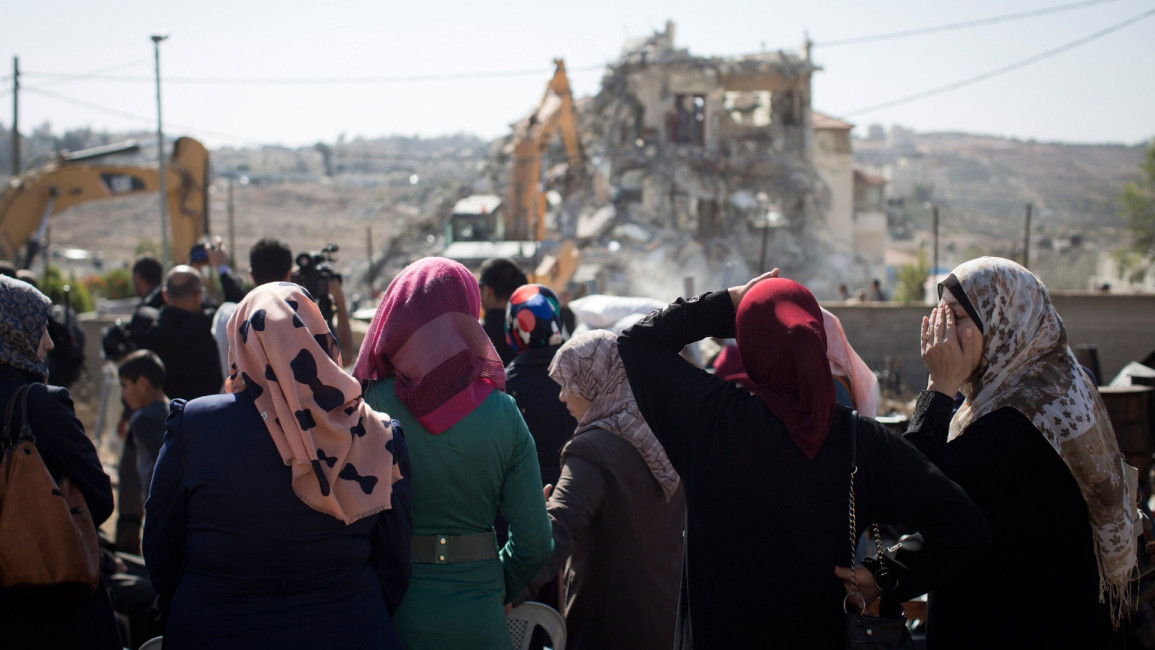Analysis: With house demolitions reaching record highs, the Bennett government has also advanced settlement plans which would be a death blow to the already slim prospects for a two-state solution.

Analysis
Ali Adam
06 January, 2022
For decades, successive Israeli governments have cumulatively worked to expand and deepen control over the occupied Palestinian territories (oPt) to prevent the establishment of a Palestinian state.
However, the current government, led by far-right Israeli Prime Minister Naftali Bennett, seems to have taken it upon itself to end any remaining prospects for Palestinian self-determination once and for all.
“Since the theoretical ‘government of change’ came to power half a year ago, it has successfully undertaken systematic measures to sabotage any remaining viability of a negotiated political solution and severely undermine Palestinian human rights,” Ir Amim, an Israeli anti-occupation advocacy group, said in December.
"Since Bennett assumed office, there's been an unprecedented escalation by the Israeli government in terms of advancing settlement expansion in the most sensitive areas that impacts the viability of the two-state solution"
Over the past few months, the Bennett government has been advancing settlement construction in locations that would entail a death blow to any future efforts for the establishment of a viable and contiguous Palestinian state.
According to a recent report published by Haaretz, the Israeli government is currently promoting a new widespread settlement project across East Jerusalem – a move that would result in the eviction of Palestinian residents from their homes.
The six planned settler neighbourhoods would be located in Sheikh Jarrah, Beit Safafa, Sur Baher, Beit Hanina, and near the Old City’s Damascus Gate.
These planned settlements also come on the heels of highly controversial and politically consequential settlement plans which the Israeli government has advanced in recent months.
Israel's home demolition policy: A form of ethnic cleansing
Analysis Emad Moussa
In mid-October, Israel approved the expropriation of land for the Givat Hamatos settlement in southern Jerusalem. Infrastructure work has already begun, with the government planning to construct 1,257 new housing units despite international outcry.
In the same month, the Israeli government also advanced the construction of 3,400 housing units in the E1 area to expand the Maale Adumim settlement.
Any further construction in these two controversial areas has long been considered a red line by the international community as it means effectively dissecting the West Bank in two, rendering a two-state solution impossible.
Construction in Givat Hamatos would surround East Jerusalem and cut it off from the southern West Bank, while settlement expansion in the E1 area would bisect the West Bank and torpedo any prospects of a viable and contiguous Palestinian state.
“Since Bennett assumed office, there’s been an unprecedented escalation by the Israeli government in terms of advancing settlement expansion in the most sensitive areas that impacts the viability of the two-state solution,” Palestinian political analyst Muhammad Shehada told The New Arab.
“Almost all of the settlement projects that had been shelved by Israel since 2012 due to international pressure, are now being unabashedly advanced by Bennett’s government,” he said.

Israel is advancing settlement construction in locations that would be a death blow to a viable and contiguous Palestinian state, such as the E1 area. [Getty]
“If completed, these settlement projects will terminate any remaining possibilities for Palestinian statehood, and will cantonize the Palestinian territories into isolated enclaves,” Shehada added.
“These settlements projects surrounding Jerusalem, in particular, will isolate the city from the rest of the Palestinian territories, and radically alter its demographic reality”.
Despite decades of impunity for settlement construction, Israel has in the past refrained from building in these sensitive areas for fear of an international response.
But with Bennett, a former head of the settler Yesha council, as prime minister, and a US administration largely indifferent to the Israeli-Palestinian conflict, that seems to have changed.
Shehada believes the lack of international accountability that Israel has been afforded over the decades is certainly part of its decision to advance these new settlement plans.
"The Bennet government took advantage of international silence and the complicity of certain Arab countries that normalised ties with Israel, to intensify these settlements projects, especially surrounding the city of Jerusalem"
“What has encouraged Israel to advance these sensitive settlements projects is the failure of the international community to translate international resolutions against Israeli settlements into practical steps on the ground, and its failure to impose consequences on Israel,” Shehada said.
“The Bennet government took advantage of international silence and the complicity of certain Arab countries that normalised ties with Israel, to intensify these settlements projects especially surrounding the city of Jerusalem,” he added.
Since assuming office, the Biden administration has been reluctant to engage with Israel-Palestine beyond reinforcing the status quo.
This has included bolstering the Palestinian Authority while refusing to exert any real pressure on Israel at all, whether concerning house demolitions, the Gaza war, or new settlement plans.
As such, even the routine condemnation of settlement plans has been interpreted as diplomatic lip service rather than opposition.

2021 saw a five-year high in Palestinian home demolitions, according to rights groups. [Getty]
At the end of October, a source close to Bennett told Zman Yisrael, The Times of Israel’s sister site, that Israel believed the Biden administration was indifferent to the new settlement plans.
“Contrary to the impression they’re trying to make, the Americans don’t care that much about the Ministry of Construction and Housing’s decision, and they have no problem tolerating it,” the source said
“This construction is not part of the conversation we are having with the Americans. We noticed that,” the source added.
The extent of the impunity Israel feels was reflected by the decision to announce the expropriation of public land for the Givat Hamatos settlement while Israeli FM Yair Lapid was visiting Washington in October.
Indeed, this preferential US treatment of Israel is unlikely to change, despite military aid that could be used as leverage to extract minimal concessions, such as a settlement freeze, from Tel Aviv.
Additionally, the Biden administration is seriously considering adding Israel to the US waiver programme, a benefit being considered without reciprocal concessions.
The lack of US interest in the conflict has tangible repercussions on the ground. In addition to settlement building, recent months have also seen a sharp increase in settler violence against Palestinians, and, notably, the designation of Palestinian human rights groups as terrorist organisations.
House demolitions have also escalated, a policy that often works hand in hand with settlement expansion.
Since the Bennett government assumed office in June 2021, 472 structures have been destroyed, including 90 donor-funded structures, affecting 10,273 Palestinians.
At the end of October, a source close to Bennett told Zman Yisrael, The Times of Israel’s sister site, that Israel believed the Biden administration was indifferent to the new settlement plans.
“Contrary to the impression they’re trying to make, the Americans don’t care that much about the Ministry of Construction and Housing’s decision, and they have no problem tolerating it,” the source said
“This construction is not part of the conversation we are having with the Americans. We noticed that,” the source added.
The extent of the impunity Israel feels was reflected by the decision to announce the expropriation of public land for the Givat Hamatos settlement while Israeli FM Yair Lapid was visiting Washington in October.
Indeed, this preferential US treatment of Israel is unlikely to change, despite military aid that could be used as leverage to extract minimal concessions, such as a settlement freeze, from Tel Aviv.
Additionally, the Biden administration is seriously considering adding Israel to the US waiver programme, a benefit being considered without reciprocal concessions.
The lack of US interest in the conflict has tangible repercussions on the ground. In addition to settlement building, recent months have also seen a sharp increase in settler violence against Palestinians, and, notably, the designation of Palestinian human rights groups as terrorist organisations.
House demolitions have also escalated, a policy that often works hand in hand with settlement expansion.
Since the Bennett government assumed office in June 2021, 472 structures have been destroyed, including 90 donor-funded structures, affecting 10,273 Palestinians.
In-depth Sally Ibrahim
This represents an astounding 143% increase in Palestinians affected by demolitions under the Bennett government compared to a similar period in 2020, according to the United Nations Office for the Coordination of Humanitarian Affairs (UNOCHA).
The total number of house demolitions in 2021 marked a five-year high, according to B’Tselem, while the destruction of non-residential structures, including agricultural, business, or public structures, reached the highest number since 2012.
“Expanding these particularly dangerous settlement projects makes clear that the Israeli government’s ‘shrinking the conflict’ mantra has only ever been about optics, PR, and lip service,” Shehada said.
“What’s more problematic is that the Biden administration is playing along; applauding whenever Israel throws some occasional crumbs of mercy on the occupied Palestinian population, and looking the other way when Israel bulldozes the two-state solution,” he added.
Ali Adam is a journalist and researcher whose work focuses on issues linked to the Israeli-Palestinian conflict
No comments:
Post a Comment